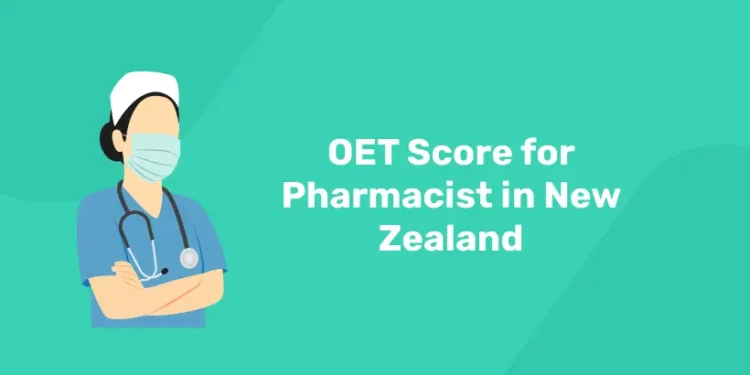Table of Contents
Are you considering taking the OET exam but are unsure about the OET Score for Pharmacist in New Zealand?. Well, The OET (Occupational English Test) is accepted as verification of English language proficiency by a large number of nations and organizations worldwide. As a reliable language assessment tool for healthcare practitioners, OET has grown in popularity from New Zealand to the UK and even Canada. So, if you are wondering about the OET Score for Pharmacist in New Zealand, read on to find out more!
Elevate your OET scores with Entri! Join for Free Demo Class!
Introduction
In New Zealand, clinical pharmacy and primary healthcare are given a lot of attention.In New Zealand, the pharmacy industry comprises three professions: pharmacy assistants, technicians, and pharmacists. Everyone plays a specific role. They are employed by the pharmaceutical company or by a hospital or community pharmacy.
With more than 50 million prescriptions filled annually, pharmacies play a crucial role in the health care system in New Zealand. There are several different pharmaceutical careers in New Zealand. There are 900 community pharmacies spread across the nation’s cities, malls, and small villages; you may work at one of them. In addition, pharmacy departments are present in many smaller hospitals as well as all major hospitals.
In order to become a registered pharmacist in New Zealand, a candidate must meet all eligibility standards outlined in the Pharmacy Act 1970 and Pharmacy Regulations 1975, as well as the essential qualifications in pharmacy.Before being added to the register, all candidates must fulfill the Pharmaceutical Society of New Zealand’s definition of the Competency Standards for Pharmacists at the Pharmacist level.
Steps involved in OET Pharmacist in New Zealand
The Council of the Pharmaceutical Society of New Zealand will evaluate each application on an individual basis and issue written confirmation of its judgments when determining your suitability to practice the medicine in New Zealand.
Step1: Firstly, the Initial Application
Step2: Evaluation of the Experience and the Qualifications
Step3: Presenting the Evidence that in Orally
Step4: The Ethics and Law in the Pharmacy Exam
Step5: The Pre-registration Program for the 26 Weeks
Step6: Lastly, Evaluation of the Pre-Registration
Elevate your OET scores with Entri! Join for Free Demo Class!
Why is OET Required for Pharmacist in the New Zealand?
New Zealand is well-known for its breathtaking scenery and the dynamic culture, but it’s also well-known for its excellent healthcare. It is imperative that the pharmacists who wish to work in New Zealand they speak and understand English. The Occupational English Test (OET) is very important in this situation.
1. Ensuring the Patient Safety and Care
Making sure that the pharmaceuticals are used safely and effectively is a pharmacist’s main duty. This require having open lines of communication with the patients about their medicines, any possible adverse effects, and how to take medications correctly.
The Ineffective communication on the part of a pharmacist can result in confusion, which can then lead to drug blunders, improper dosages, or other serious errors that could risk the patient safety. The OET evaluates a candidate’s proficiency with English in a medical context to make sure they can tell the patients in a clear and the correct manner.
2. The Professional Communication
Pharmacists deal with the doctors, nurses, and specialists among other healthcare professionals on a regular basis. Discussing the patient care plans, exchanging the important medical information, and making sure that everyone in the healthcare team is in agreement all depend on the effective communication. The OET tests speaking, listening, reading, and writing abilities in a healthcare setting to make that pharmacists are able to interact in English in a proficient and the professional manner.
3. The Regulatory Compliance
Proof of English language competency is a requirement of the Pharmacy Council of New Zealand for the registration. By attach to this criteria, the professional pharmacists are guaranteed to have the language proficiency required to carry out their tasks with the competence. The Council ensures that pharmacists meet a constant and dependable standard of English proficiency by permitting the OET, which is in line with the nation’s goal to provide the high-quality healthcare.
4. Including the Healthcare System
The healthcare system in the New Zealand is dynamic and team-oriented. Pharmacists need to collaborate effectively with a range of stakeholders and the healthcare professionals. The English language proficiency makes it easier for the pharmacists to integrate into the system.
Also participate in the team meetings, contribute to conversations about patient care, and work well with others. The Pharmacists are guaranteed to be well-prepared for these interactions by the OET’s emphasis on the real-world healthcare settings.
5. The Cultural Awareness and Sensitivity
Because of the country’s cultural diversity, New Zealanders need to be skilled in navigating the ease of patient interactions. Proficiency in the language is not the only requirement for effective communication; cultural sensitivities and the situations must also be understood. By creating the trust and enhancing patient outcomes, the OET helps guarantee that the pharmacists can interact politely and successfully with the patients from a variety of backgrounds.
6. Continuing Education and the Professional Development
Pharmacy is a discipline that is always changing, with new studies, policies, and the procedures appearing on a regular basis. The majority of this data is accessible in English. The Pharmacists must be able to communicate in the language in order to take advantage of the professional development opportunities, participate in continuing education, and keep current on the new advancements. The OET guarantees that the pharmacists possess the language proficiency required to access and understand these materials.
OET Score Requirements for Pharmacists in New Zealand
There are four subtests in the OET: Speaking, Writing, Reading, and Listening. A distinct component of language competency that is essential for the efficient communication in the healthcare settings is evaluated by each subtest. The Pharmacy Council of New Zealand requires the Pharmacist in New Zealand to obtain the following minimum scores:
- Listening: It should be Grade B (minimum score of 350)
- Reading: It should be Grade B (minimum score of 350)
- Writing: It should be Grade B (minimum score of 350)
- Speaking: It should be Grade B (minimum score of 350)
Elevate your OET scores with Entri! Join for Free Demo Class!
New Zealand OET score for Doctors
The OET, or the Occupational English Test, is considered especially for the healthcare workers. It evaluates the language proficiency required for the efficient communication in a medical setting. OET is especially important for the physicians because, in contrast to the regular English exams, it concentrates on the medical terminology and scenarios.
The purpose of OET for the Doctors is to assess the language required for practicing the medicine. Essentially, it’s an analysis of the applicant’s accuracy in discussing the medical problems and situations with the patients, their families, and other medical professionals.
1. Listening Format
All the members of the medical community, including the physicians, take the Listening subtest.
1. Part A: Take notes while listening to the two patient consultations.
2. Part B: Answer one multiple-choice question for each brief workplace encounter that you hear on the recordings.
3. Part C: Respond to the multiple-choice questions after hearing two talks or the interviews.
2. Reading Format
1. Part A: Read compressed texts on a single healthcare topic and then provide an overview in response to a summary.
2. Part B: Short texts with one multiple-choice question each about communications relating to the workplace are presented to the candidates.
3. Part C: Read lengthy literature on the medical subjects and provide the multiple-choice answers.
3. Writing Format
Writing a letter of recommendation, a letter of discharge, or any other type of correspondence based on the medical case notes is required for the Writing sub-test for the physicians. This is only intended for the medical professionals.
4. Speaking Format
This subtest consists of role-plays in which the candidate must talk with a patient or a family member while focusing on medical scenarios. Such as the interactions include giving a diagnosis, going over the treatment options, or gathering the medical history.
OET Score Requirements for Doctors
In order to become a doctor in New Zealand, applicants need to meet certain requirements on the each OET component. There are four subtests in the test: Speaking, Writing, Reading, and Listening. The following are the minimum scores required by the Medical Council of New Zealand:
- Listening: Required a minimum score of B (350 points)
- Reading: Required a minimum score of B (350 points)
- Writing: Required a minimum score of B (350 points)
- Speaking: Required a minimum score of B (350 points)
These results will guarantee that the physicians have the language proficiency needed to carry out their responsibilities and interact with the patients and coworkers without any difficulty.
Conclusion
The purpose of the OET score requirements for the pharmacists in New Zealand is to guarantee that they have the proficiency in the English language needed to deliver the high-quality care and effectively communicate within the country’s healthcare system. Obtaining the necessary scores guarantees the pharmacists can carry out their responsibilities safely and proficiently in addition to satisfying the regulatory criteria. Pharmacists can achieve these standards and start a successful career in New Zealand’s dynamic healthcare sector by concentrating on medical English and then preparing thoroughly.
Elevate your OET scores with Entri! Join for Free Demo Class!
Frequently Asked Questions
1: What is the primary purpose of a patient’s discharge summary?











